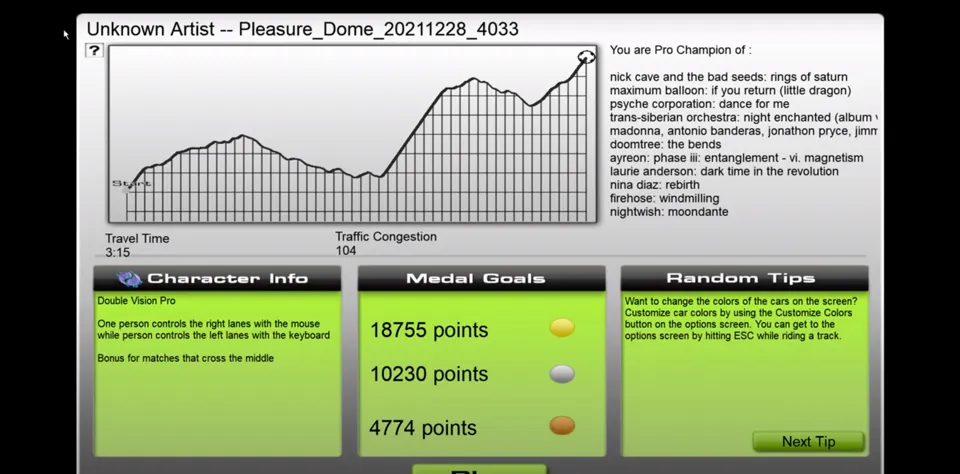Audiosurf
When sitting down to write this review, I was conflicted about how to actually write it. As an consistent reader of my reviews will note, I tend to less review games, and more muse about them - what works and what doesn’t work, what they represent, the ideas they espouse, those sorts of things. Reviewing, in my mind, is shallow if I look solely at mechanics, so I instead look at the product as a whole, and what it is trying to do.
When thinking about Audiosurf, I’m looking not only at a game, but at a particular zeitgeist it represents. This was one of the first games in my Steam library. I played it obsessively during grad school, curled up beside my partner, and getting annoyed at him when he got credit for my combos, or when he dropped a block on me that I didn’t want. Once I got older and my Steam library expanded, Audiosurf fell by the wayside, replaced by the long, long list of other games you’ve seen a tiny sampling of in this series. The memory of it has always hung there, though, a warm friend that reminds me of cold rooms, snuggly blankets, and the murmur of someone else’s life through walls that are just a touch too thin.
It is impossible for me to separate this game from my nostalgia for it, and thus, I resolved the conflict in the best way I could think. I embraced it by calling my partner over, scrounging through my harddrive for mp3s, and curling up beneath a snuggly blanket in a cold room, letting myself get swept up in colours, music, and the slight irritation when I see the wrong colour block come down. We spent the evening, playing Audiosurf and pretending we were young, and it was wonderful. This is the power of Audiosurf, or at least of nostalgia. For those few songs, we were 22 again, and all of life had yet to really begin.
As a caveat, if you do watch the video I’ve attached to the review, know that it’s a bit of shameless necessary self-promotion. I picked the only songs I could think of that wouldn’t be copyright-striked by Youtube and have the audio removed from the video, thus defeating the point. I hope you enjoy.
 This is a
map of the round and nothing else.
This is a
map of the round and nothing else.
Audiosurf is a rhythm game where the player collects (or avoids, depending on the game mode) different coloured blocks in time to the rhythm and energy of their music. These blocks are then combined into groups to gather as many points as possible. While the game has several different modes, the gameplay stays fairly similar across all of them - the player interacts with blocks that are cued by the music the player has selected.
While the game does have some of its own music (it includes Valve’s orange box music, as well as its own theme), all other music must be drawn from music files on the player’s hard drive. As I settled in to play this game, I found myself in a pickle. I use Spotify, and haven’t had music files that aren’t my own on my hard drive in a very long time. It’s this as well that makes Audiosurf feel like it’s from another era. Its community page from Steam includes a guide from 2015 on how to acquire music files that is itself outdated, its instructions about iPods and quicktime long ago ceasing to be relevant. For this review, I asked my friend to send me music he thought I would like, then recorded myself playing my own songs. None of these were the songs I originally played Audiosurf with. There was no Ayreon, no Muse, no Trans-Siberian Orchestra spinning through the colourful void. I had my own voice, or those that a friend thought I would enjoy.
 I think this
displays me getting cheated out of points yet again.
I think this
displays me getting cheated out of points yet again.
This is, however, the genius of Audiosurf. On the one hand, it is, as I said, a product of a time when rhythm games were the game to play. It is a quintessential rhythm game, albeit with a bit more strategic thought than just hitting a button or stamping a foot at the right moment. It is still a game that requires a careful coordination of action with music. However, unlike other rhythm games, I’d argue that Audiosurf, rather than supplementing the gameplay with music, instead supplements the music with gameplay. In paying attention to the blocks and glancing up the road ahead of me, I thought about what the music would do, and prepared for the parts where I knew the beat picked up. When the music got exciting, the track twisted and curled, and I found myself singing along just that much louder. The adrenaline of following the course and collecting the little blocks heightens the emotion of the music and forces you to pay attention in a way you never have before. It’s the texture of the music that comes to life, not just the sound of it. It is an entirely different experience, and one that is incomparable to anything else.
 This one is
a calmer song.
This one is
a calmer song.
The true beauty of Audiosurf is a subjective one. While games like Rockband or Guitar Hero might have a better overall gameplay experience (or at least a more complete one), Audiosurf doesn’t aspire to be that. The beauty of the game is in experiences like mine, of curling up beside a friend with the song you love and just want to feel in a more visceral way. It’s in the taste of tinned lentil soup from the Lidl down the hill lingering in your mouth as you play “The Lighthouse” by Ayreon for the third time that week, because that’s just how you feel. It’s in a toe poking out from under a too small blanket while your partner picks out the weird dormouse song you don’t even know the name of, but which you will slog through because it means you’re together. It’s in dreading going outside and having this moment end, so instead loading up the song you danced to at your wedding, and dancing yet again.
 The course
begins.
The course
begins.
If you pick Audiosurf up today - and you should, because it’s very good - you will not have the exact same experience I had. You may have the same puzzle of deciding how to obtain enough mp3s to play the game, but beyond that, your experience will be entirely your own. It is your music, and your response to that music, that shapes Audiosurf, both metaphorically and in a very literal way. Music is perpetually subjective, and those tools which we build to engage with it inherently reflect that. Audiosurf is a deeply simple game mechanically that still provides something profound. It provides a way to feel music and to experience it, and in doing so, cement it into our psyches as something greater. It is a fantastic game, but it is also something more.
Developer: Dylan Fitterer
Genre: Rhythm
Year: 2008
Country: United States
Language: English
Play Time: However Long Your Preferred Songs Are
Youtube: https://youtu.be/7EBTdr7u0UY
